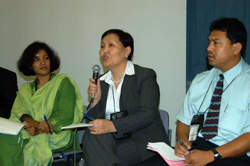Press Release
Asian AIDS Conference Stresses Need to Focus on Most Vulnerable
05 July 2005
Press Release
05 July 2005
KOBE, Japan—Large-scale HIV-prevention efforts linked to treatment could save 6 million Asians from infection in the next five years, participants at a regional AIDS conference were told this week. But despite progress, epidemics are still growing in most countries. The numbers affected could rise by 12 million by 2010 without stronger political commitment and a focus on reaching groups most at risk.

Dr. Peter Piot, Executive Director of UNAIDS, told the opening session of the 1-5 July Seventh International Congress on AIDS in Asia and the Pacific that “the vast majority of countries” in the region “are doing too little on AIDS”.
“For example, end-2003 figures show that in East and South-east Asia, HIV prevention programmes reached just one of every five sex workers, one of every 20 injecting drug users and one of every 50 men who have sex with men.”
An estimated 8.2 million people in Asia and the Pacific—including 5.1 million in India— are living with HIV; 1.2 million were infected last year. Just 15 per cent of those needing antiretroviral drugs receive them, though the number has risen three-fold in the past 12 months. Epidemics, often driven by drug use and paid sex, are growing fastest in Indonesia, Nepal, Viet Nam and China. Cambodia has joined Thailand in reducing HIV prevalence. The region’s highest adult prevalence, 1.7 per cent, is in Papua New Guinea.
Dr. Piot, like others, noted that low-prevalence countries have an opportunity to avoid higher infection rates but should not be complacent. Each country, he stressed, needs to implement a strategy based on its own social and political realities and an understanding of how the disease is spreading there. He hailed China’s recent intensification of AIDS prevention and Malaysia’s new harm reduction policy as examples of the political will needed throughout the region.
In dozens of breakout sessions, researchers, organizations involved in fighting AIDS and advocates for people living with HIV shared their experiences.
UNFPA, the United Nations Population Fund, organized a forum on scaling up HIV prevention for young people, featuring peer educators from China and Kyrgyzstan and programme managers from India, Mongolia and Nepal. Each speaker recounted steps taken to gain community support and increase outreach.
In another session, Dr. Wasim Zaman, Director of UNFPA’s Country Technical Services Team (CST) for South and West Asia presented examples showing the importance of involving young people in designing programmes aimed at youth. Kiran Bhatia, gender adviser from the team, spoke in a session on AIDS prevention in the response to the tsunami; she emphasized the need to address women’s vulnerability in emergency situations.
Two CST advisers on HIV/AIDS from the region, Dr. Chaiyos Kunanusont from Bangkok and Dr. Farah Usmani from Kathmandu, spoke in a UNFPA-organized session on the female condom.
The International Planned Parenthood Federation and UNFPA hosted a discussion among service providers and policy makers on the integration of HIV interventions, including voluntary testing and counselling, in reproductive health programmes.
At the closing session, Dr. J.V.R. Prasado Rao, Director of UNAIDS Regional Support Team for Asia and the Pacific, reiterated the importance of reaching vulnerable populations—sex workers and their clients, injecting drug users, young people, migrant workers and men who have sex with men. “Without a doubt, we will have to concentrate our efforts on these groups, despite the taboos, the social constraints or the moral arguments,” he said.
“Voices at this conference have also called for an end to scattergun approaches to AIDS programming and the beginning of an era of harmonization and coordination of efforts and resources,” he added. “This is essential if we are to stop duplicating efforts, make the money work, and ensure the resources we already have are used wisely.”
* * *
For more information: William A. Ryan, ryanw@unfpa.org, tel. +66 2 288 2446, mobile +66 9 897 6984.